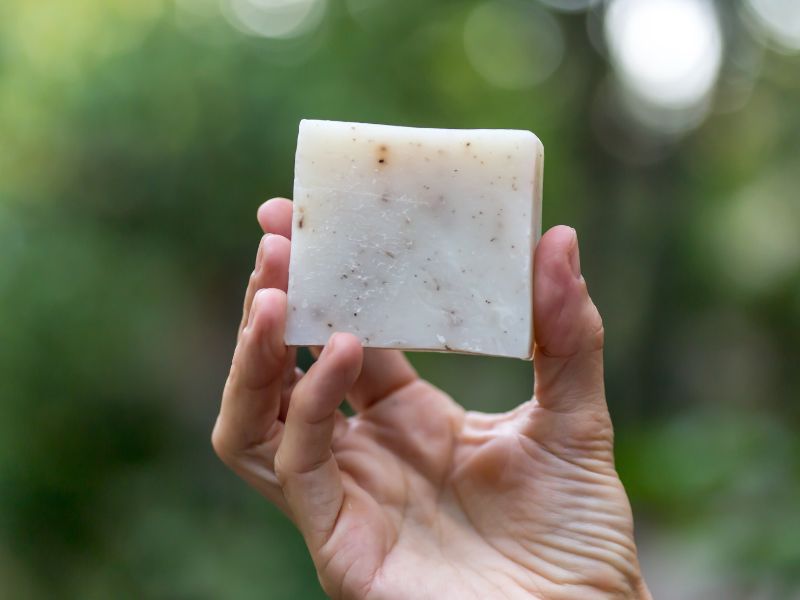Natural soap is often marketed as a healthier alternative to conventional soaps, as it is made with natural ingredients and free from harsh chemicals.
However, there is a common misconception that natural soap does not lather well, which may deter some people from making the switch. But is this really the case?
The answer is no, natural soap can lather just as well as conventional soap. In fact, the amount of lather produced by a soap is not necessarily an indication of its cleaning power. Rather, it is the result of the interaction between the soap's ingredients and the water.
Natural soaps contain ingredients such as coconut oil and olive oil, which are known to produce a rich, creamy lather when they come into contact with water.
What is Natural Soap?
Natural soap is a type of soap that is made from natural ingredients such as vegetable oils, essential oils, and herbs. Unlike commercial soaps, natural soaps are free from synthetic fragrances, dyes, and preservatives.
Natural soap is made through the process of saponification, which involves mixing oils or fats with an alkali (such as lye) to create soap. The resulting soap is gentle on the skin and does not strip it of its natural oils.
Some popular ingredients used in natural soap include olive oil, coconut oil, shea butter, and castor oil. These ingredients provide various benefits to the skin, such as moisturizing, cleansing, and soothing.
Fkn Manly prides itself on making the best natural soap for men. We use only natural ingredients that get your really Fkn clean and leave you smelling really Fkn great.
Check out our wide selection of all natural soaps in our shop here.

What Makes Soap Lather?
Soap is a daily necessity for most people, but have you ever wondered what makes it lather? There are a few factors that contribute to soap's lather, including the saponification process and the types of surfactants used.
Saponification Process
The saponification process is the chemical reaction that occurs when oils or fats are mixed with an alkali such as lye. This process results in the creation of soap and glycerin. The soap molecules have two ends - one end is attracted to water (hydrophilic) and the other end is attracted to oil (lipophilic). When mixed with water, the soap molecules arrange themselves in a way that allows them to surround and lift away dirt and oil from the skin.
Types of Surfactants
Surfactants are compounds that lower the surface tension between two substances, such as water and oil. They are the key ingredient that makes soap lather. There are two main types of surfactants used in soap-making:
- Anionic surfactants - These are the most common type of surfactant used in soap-making. They have a negative charge and are effective at removing dirt and oil from the skin.
- Nonionic surfactants - These surfactants have no charge and are less effective at removing dirt and oil. They are often used in combination with anionic surfactants to create a milder, gentler soap.
It's important to note that not all surfactants are created equal. Some synthetic surfactants can be harsh and irritating to the skin, while natural surfactants such as those found in plant-based soaps are gentler and more environmentally friendly.

Does Natural Soap Lather Well?
Natural soap has become increasingly popular in recent years, as people seek out more environmentally friendly and healthier options for their personal care products. However, some people wonder if natural soap lathers as well as synthetic soaps.
Factors that Affect Lather
Several factors can affect how well natural soap lathers, including:
- The type of oil or fat used in the soap-making process
- The hardness of the water used to wash with the soap
- The amount of soap used
- The temperature of the water
Some natural oils and fats, such as coconut oil and palm oil, are known to produce more lather than others. Hard water can also reduce lather, while soft water can increase it. Using too much soap can actually reduce lather, as can using water that is too hot or too cold.
Comparison with Synthetic Soaps
While some people may assume that synthetic soaps lather better than natural soaps, this is not always the case. In fact, many synthetic soaps contain harsh detergents that can strip the skin of its natural oils and leave it feeling dry and irritated.
Natural soaps, on the other hand, are often formulated with nourishing ingredients that can help to soothe and moisturize the skin.
It's worth noting that some natural soaps may not produce as much lather as synthetic soaps, but this does not necessarily mean that they are less effective at cleaning the skin. In fact, many people find that natural soaps leave their skin feeling cleaner and more refreshed than synthetic soaps.
We recently wrote a detailed comparison of Natural soap vs Regular soap where you can learn about the differences between natural vs detergent-based soaps and the benefits of switching to all-natural soap.
Benefits of Using Natural Soap
When I started making all-natural Fkn Manly soaps I noticed my skin felt way better. My wife loved the feeling of rubbing her hand against my smooth skin and I loved the fact that there were no chemicals being rubbed all over my body.
You can see our full lineup of all natural soaps here.
Many people are switching to natural soap for its many benefits. Here are some reasons why:
Gentler on Skin
Natural soap is made with ingredients that are gentle on the skin. It doesn't contain harsh chemicals or synthetic fragrances that can irritate the skin. Instead, it uses natural ingredients like essential oils, herbs, and plant extracts that have soothing and nourishing properties. This makes it a great option for people with sensitive skin or skin conditions like eczema or psoriasis.
Eco-Friendly
Natural soap is also better for the environment. It's made with biodegradable ingredients that won't harm the environment when they're washed down the drain. Additionally, many natural soap makers use sustainable and ethical practices in their production, like sourcing ingredients from local farmers or using recycled packaging materials.
Variety of Natural Ingredients
Natural soap comes in a variety of scents and ingredients, so you can find one that's perfect for you. Some popular ingredients include lavender, tea tree oil, shea butter, and oatmeal. Each ingredient has its own unique properties and benefits, so you can choose a soap that's tailored to your skin's needs.
Conclusion
Based on the research and analysis conducted, it is clear that natural soap can lather well. However, the lather may not be as abundant or long-lasting as synthetic soaps due to the absence of certain chemicals that create a more luxurious foam.
It is important to note that the lathering ability of natural soap can vary depending on the specific ingredients used and the manufacturing process. Some natural soaps may lather better than others, and while some commercial detergent based soaps may make bigger bubbles, our all natural soap makes a creamy and rich lather that gets you clean from head to toe.
Overall, while natural soap may not produce the same level of lather as synthetic soaps, it still provides effective cleansing and can be a great choice for those who prioritize using natural and eco-friendly products.

